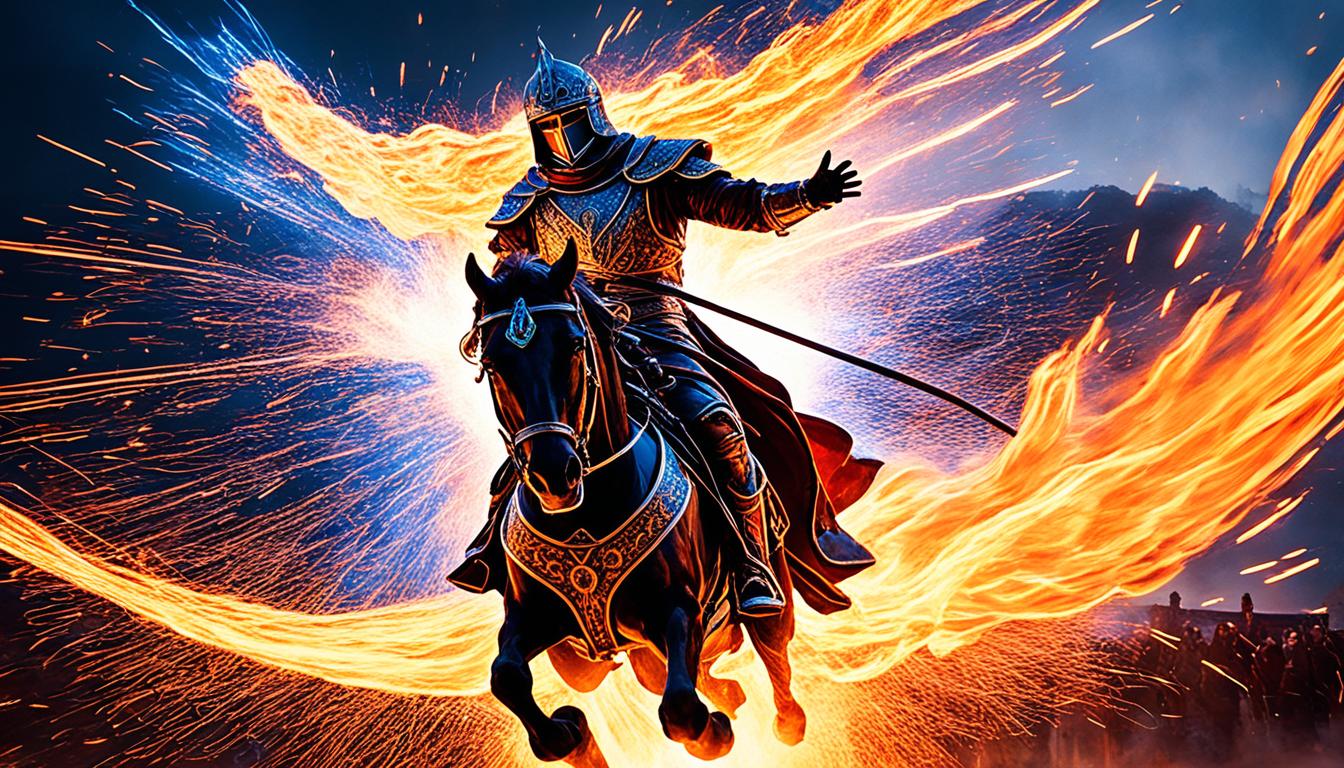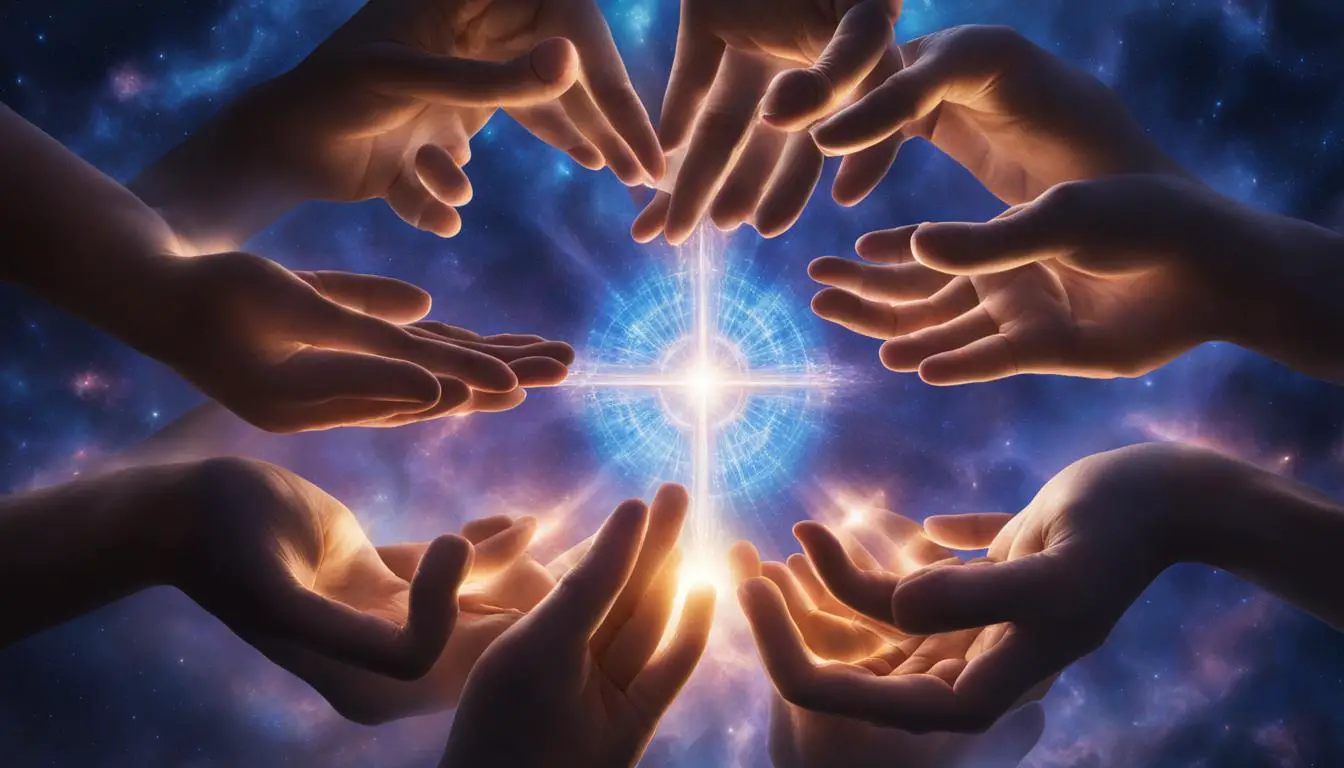Elijah, one of the most prominent prophets in the Bible, is known for his extraordinary life filled with miracles and powerful confrontations. His story unfolds during the reign of King Ahab in the 9th century BC, where his unwavering faith and deep connection with God led to incredible feats.
Throughout his life, Elijah performed remarkable miracles that showcased the power and authority of Yahweh, the God of Israel. From calling fire from heaven to parting the Jordan River, each miracle demonstrated God’s presence and Elijah’s unique role as His chosen prophet.
One of the most awe-inspiring moments in Elijah’s journey is his encounter with the chariot of fire. This remarkable event marked his ascent to heaven, leaving an indelible mark on biblical history.
Throughout this article, we will delve into the fascinating life of Elijah, exploring his miracles, his confrontations with King Ahab, and his profound impact on religious traditions.
Key Takeaways:
- Elijah, a prominent biblical prophet, lived during the reign of King Ahab in the 9th century BC.
- He performed incredible miracles that demonstrated the power of Yahweh.
- Elijah confronted King Ahab and his wife Jezebel for their worship of the Canaanite deity Baal.
- His ascent to heaven in a chariot of fire left a lasting impact on biblical history.
- Elijah’s role in religious traditions, including Judaism, Christianity, and Islam, underscores his significance.
Miracles of Elijah and Elisha
Elijah and his understudy Elisha were renowned for their ability to perform miracles, which demonstrated the power and faithfulness of Yahweh, the God of Israel. These miracles served various purposes, reinforcing the importance of faith and emphasizing the divine authority of the prophets.
Miracle of Raising the Widow’s Son
One of Elijah’s notable miracles occurred in the town of Zarephath, where he met a widow and her deceased son. Through the power of God, Elijah raised the widow’s son from the dead, revealing his role as a vessel of divine intervention and exhibiting Yahweh’s compassion for those in need. This miracle symbolized the restoration of life and served as a testament to the belief that nothing is impossible with God.
Calling Fire from Heaven on the Altar
Another remarkable miracle performed by Elijah took place on Mount Carmel. In a confrontation with the prophets of Baal, Elijah challenged them to call upon their deity to ignite their sacrificial altar, while he called upon Yahweh to do the same. Despite the prophets of Baal’s fervent prayers and self-inflicted wounds, their altar remained unlit. However, when Elijah called upon Yahweh, fire descended from heaven, consuming the offering, the altar, and even the surrounding water. This miraculous display of divine power showcased Yahweh’s supremacy and condemned the worship of false gods.
Parting of the Jordan
Elijah and Elisha crossed the Jordan River on dry ground, parting the waters just as Moses had done centuries earlier. This miracle not only demonstrated the prophets’ connection to the miracles of the past but also marked the beginning of Elisha’s ministry as Elijah’s successor. It symbolized a new chapter in the prophetic legacy and affirmed the authority and anointing bestowed upon Elisha by Yahweh.
Calling Fire from Heaven upon Soldiers
In another notable incident, Elijah called down fire from heaven upon King Ahaziah’s soldiers who were sent to arrest him. Twice, the king’s forces were consumed by fire, highlighting the divine protection and vindication granted to Elijah as Yahweh’s chosen representative. Through this miracle, Elijah demonstrated his unyielding faith in God’s power and his unwavering commitment to upholding Yahweh’s authority.
To complement Elijah’s notable miracles, Elisha, who received a double portion of Elijah’s spirit, also performed astounding acts. These included raising the dead, healing contaminated waters, multiplying food, bringing forth oil, and calling fire from heaven. These extraordinary miracles cemented the prophetic legacy of Elijah and Elisha, underscoring their pivotal roles as God’s instruments of divine intervention.
Elijah’s Confrontation with King Ahab
In his unwavering commitment to the worship of Yahweh, the God of Israel, the prophet Elijah fearlessly confronted King Ahab and his wife, Jezebel, for their allegiance to the Canaanite deity Baal. This dramatic confrontation served as a powerful testament to the supremacy of the one true God and the consequences of straying from His commandments.
Elijah, guided by divine revelation, delivered a series of prophetic messages to King Ahab, exposing the wickedness of his actions and foretelling the tragic fate that awaited him and his family. One particularly chilling prophecy was the declaration that Ahab’s sons would meet a dreadful end, bringing an end to his lineage and signaling the divine judgment upon his dynasty.
Thus says the Lord: ‘In the place where dogs licked up the blood of Naboth, dogs will also lick up your blood–yes, yours!’
The prophecy against Jezebel was equally ominous, as Elijah declared that she would be devoured by dogs, met with a fate befitting her wickedness and involvement in promoting the worship of foreign gods.
Ahaziah, the son of Ahab and Jezebel, also incurred the wrath of Elijah’s prophetic words. Afflicted with a severe illness, Ahaziah sought counsel from the prophets of Baal, but Elijah intervened and pronounced that he would not recover, for his worship of false gods had led to his downfall.

This vivid image emphasizes the fulfillment of Elijah’s prophecy regarding Jezebel, a clear demonstration of the truthfulness and power of God’s words spoken through His prophet.
Elijah’s confrontation with King Ahab and the subsequent fulfillment of his prophecies not only showcased his unwavering faith and commitment to God’s commandments but also served as a stern warning to all who would compromise their devotion to Yahweh. This momentous event in biblical history remains a cornerstone of divine justice and a testament to the sovereignty of God.
Elijah and the Widow of Zarephath
During the drought, Elijah was led to the town of Zarephath, where he encountered a widow and her son. The widow was in a desperate situation, with only a barrel of meal and a cruse of oil remaining for her and her son’s sustenance. Despite the scarcity, Elijah performed a miraculous act of multiplication, ensuring that the meal and oil did not diminish as long as the drought lasted.
This divine intervention demonstrated the power of God to provide for those in need, even in the midst of scarcity. The faith and obedience of the widow in trusting Elijah’s words and sharing her meager provisions were rewarded with an ongoing supply of food.
However, tragedy struck when the widow’s son fell ill and eventually died. Elijah, displaying his connection to the divine, performed another extraordinary miracle – the resurrection of the widow’s son. This remarkable event showcased the extent of God’s power through the prophet.
“Arise!” cried Elijah, laying his hands upon the lifeless body. “The Lord, the God of Israel, has heard your cry and granted life back to your son!” And in that miraculous moment, the widow’s son opened his eyes, restored to life by the power of God through Elijah.
This resurrection further solidified Elijah’s reputation as a prophet chosen and anointed by God, capable of performing incredible feats that defied the natural order.

The story of Elijah and the widow of Zarephath serves as a profound example of God’s provision and miraculous intervention in times of great need. It emphasizes the importance of faith, obedience, and trust in the face of adversity.
Elijah’s Ascent to Heaven
Before his ascent to heaven, Elijah bestowed a profound prophecy upon his disciple, Elisha. He foretold that Elisha would receive a double portion of his spirit, ensuring the continuation of their prophetic legacy. The sequel follows…
“Ask what I shall do for thee, before I be taken away from thee,” Elijah said to Elisha. In response, Elisha requested a double portion of Elijah’s spirit, a request that would test his faith and commitment to the prophetic calling.
Elijah’s prophecy of Elisha’s double portion of spirit would be fulfilled in due time. As the day approached for Elijah’s departure from this earthly realm, a miraculous event unfolded. Elijah was caught up to heaven in a whirlwind, his physical form carried away by divine forces beyond human comprehension. The extraordinary nature of his departure affirmed the extraordinary nature of his ministry and the power of God working through him.
With Elijah’s departure, Elisha stepped into the role of the primary prophet, carrying the responsibility of continuing God’s work in the world. The mantle of leadership was passed on, and Elisha embraced his new calling with determination and zeal. Empowered by the double portion of Elijah’s spirit, Elisha would go on to perform astounding miracles and enact God’s will.
As Elijah ascended to heaven, his departure marked the end of an era, but it also symbolized hope and continuity. His legacy, embodied in Elisha, would carry forward the divine message and serve as a beacon of faith for generations to come.
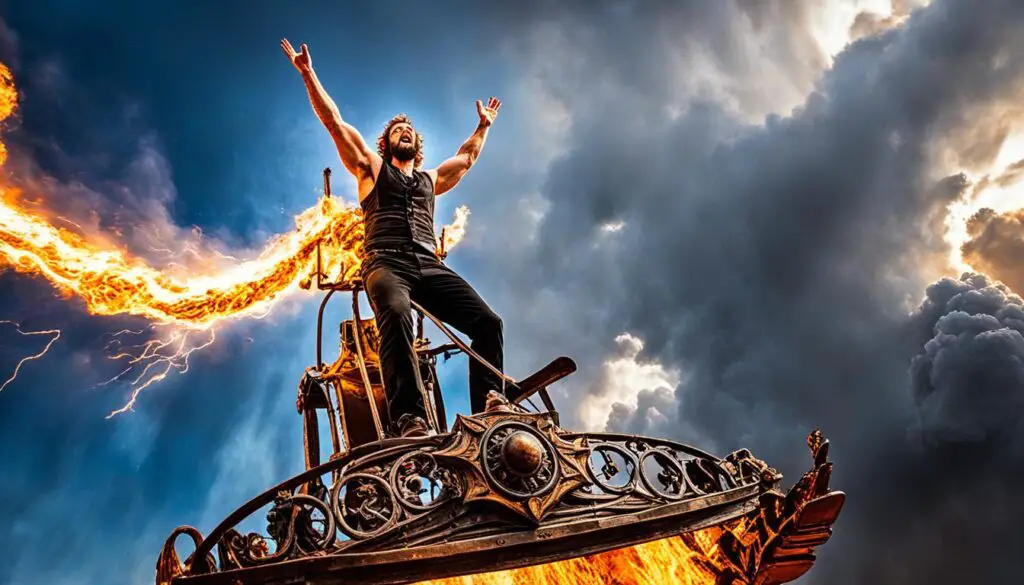
Legacy in Motion
The story of Elijah’s ascent to heaven is a testament to the extraordinary power of God and the indomitable spirit of his chosen servants. Elijah’s prophecy of Elisha’s double portion of spirit foreshadowed the passing of the torch and the enduring impact of their ministry. Their steadfast faith and unwavering dedication continue to inspire believers around the world.
In the next section, we will explore Elijah’s role as a prophet and miracle worker, delving into the remarkable acts that distinguished his ministry and shaped his legacy.
Elijah as a Prophet and Miracle Worker
Elijah, revered as a prophet in biblical accounts, not only delivered powerful messages from Yahweh but also performed remarkable miracles. His unwavering faith in the worship of Yahweh over the Canaanite deity Baal was an integral part of his prophetic ministry.
“And Elijah came near to all the people and said, ‘How long will you go limping between two different opinions? If the Lord is God, follow him; but if Baal, then follow him.’” – 1 Kings 18:21
Elijah’s commitment to defending the worship of Yahweh led to legendary displays of divine power. One of his most notable miracles involved calling fire from heaven to consume a water-soaked altar, affirming the supremacy of Yahweh in front of King Ahab and the prophets of Baal.
Elijah’s dedication extended beyond his individual mission as a prophet. He founded a school of prophets known as “the sons of the prophets,” imparting his wisdom and training young men to follow in his footsteps. This educational institution ensured the preservation of Yahweh’s worship and prophetic tradition.
| Miracles of Elijah | References |
|---|---|
| Calling fire from heaven | 1 Kings 18:20-40 |
| Multiplying the widow’s oil and flour | 1 Kings 17:7-16 |
| Resurrecting the widow’s son | 1 Kings 17:17-24 |
The significance of Elijah’s ministry extended beyond his lifetime. The Book of Malachi, the final book of the Old Testament, prophesied Elijah’s return before the coming of the Messiah:
“Behold, I will send you Elijah the prophet before the great and awesome day of the Lord comes.” – Malachi 4:5
This prophecy sparked anticipation among the Israelites, who believed that Elijah’s return would herald the arrival of the long-awaited Messiah.
As a prophet and miracle worker, Elijah left an indelible mark on biblical history. His unwavering defense of Yahweh’s worship, his establishment of the school of prophets, and the prophecy of his return continue to inspire believers to this day.
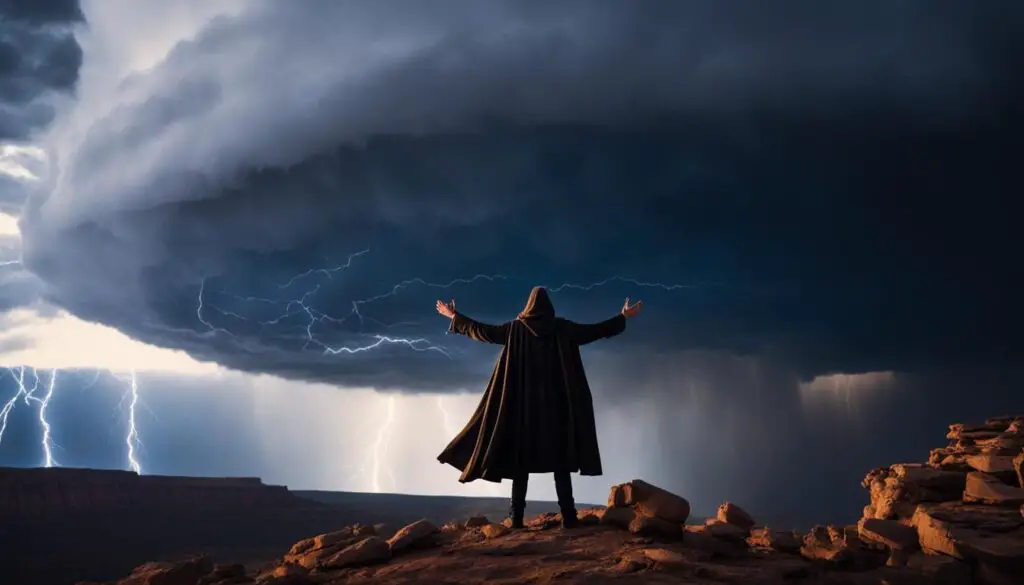
Elijah in Jewish, Christian, and Islamic Traditions
Elijah holds great significance in Jewish, Christian, and Islamic traditions. Let’s explore his role in each of these religious contexts.
Judaism
In Judaism, Elijah is revered as a powerful prophet and his name is invoked in various customs and ceremonies. One prominent example is the weekly Havdalah rite, which marks the end of the Sabbath and the beginning of the new week. During Havdalah, a special prayer is recited that mentions Elijah and his prophetic relevance.
Additionally, Elijah plays a significant role in the Passover Seder, a traditional meal and ceremony that commemorates the Israelites’ liberation from slavery in Egypt. During the Seder, there is a specific part called the “Cup of Elijah,” where a glass of wine is left untouched for Elijah, symbolizing his future arrival to announce the coming of the Messiah.
Christianity
In Christianity, Elijah is a figure of great importance, with some believers anticipating his return. The Gospel of Matthew in the New Testament describes Jesus identifying John the Baptist as a type of Elijah, fulfilling the prophecy of his return. John the Baptist, known for his baptismal rituals, prepared the way for Jesus Christ’s ministry.
This connection between Elijah and John the Baptist highlights the significant role played by Elijah in Christian scriptures and the belief in his prophetic lineage.
Islam
Elijah, known as Ilyas in Islamic tradition, is acknowledged as a revered prophet who preached against the worship of idols and false gods, particularly the Canaanite deity Baal. His stance against idolatry aligns with the monotheistic teachings of Islam.
While Elijah’s stories in the Islamic tradition may not be as extensive as in Judaism and Christianity, he is recognized as a prophet of importance and righteousness.
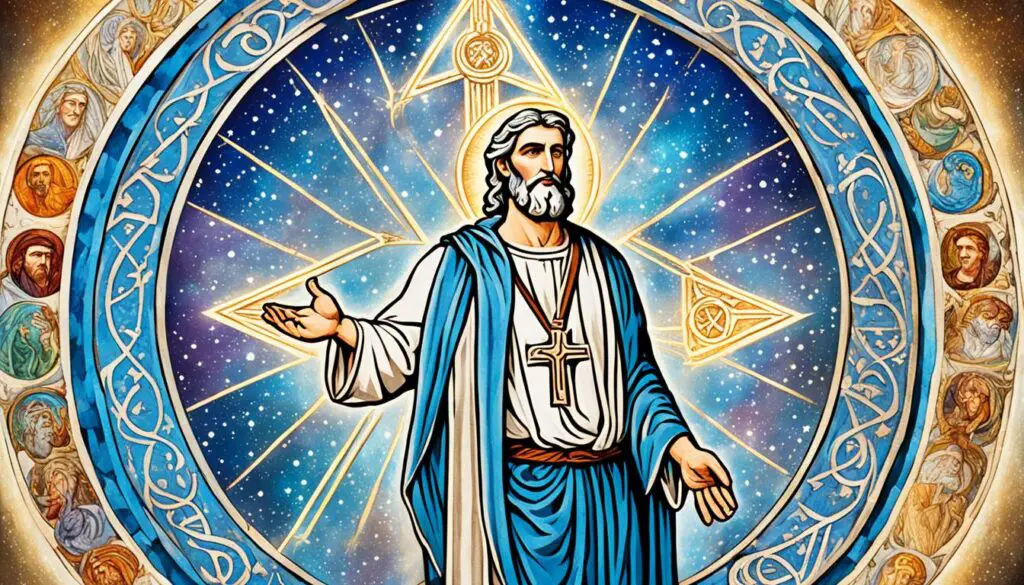
Conclusion
Elijah’s legacy in the Bible is truly remarkable. His fearless confrontations with kings, his awe-inspiring miracles, and his unwavering role as a prophet have left an indelible mark on history. Through his life, Elijah exemplified the significance of remaining faithful to Yahweh, the God of Israel, and showcased the magnificent power of God to work wonders through his chosen servants.
Elijah’s role in Old Testament prophecy cannot be overlooked. His prophecies regarding the destiny of kings, the fate of wicked individuals, and the coming of the Messiah have added layers of depth and meaning to biblical narratives. His divine insights provide further proof of the divine inspiration of the scriptures.
Not only does Elijah hold great significance in the Bible, but his influence extends to Judeo-Christian and Islamic traditions as well. In Judaism, his name is invoked in various customs, symbolizing hope and deliverance. In Christianity, Elijah’s anticipated return serves as a testament to his enduring impact, and his role as a type of John the Baptist connects the Old and New Testaments. In Islam, Elijah’s opposition to the worship of false gods is upheld as a powerful example of unwavering faith.
Elijah’s story continues to captivate and inspire people of various faiths around the world. His legacy stands as a testament to the enduring power of faith and the profound ways in which individuals can shape history. As we reflect on the life of Elijah, we are reminded of the lasting significance of his contributions to the biblical narrative and the extraordinary role he played in Old Testament prophecy.
FAQ
Who was Elijah in the Bible?
Elijah was a prophet mentioned in the biblical narrative who lived during the reign of King Ahab in the 9th century BC.
What are some of Elijah’s miracles?
Elijah performed various miracles, including causing the rain to cease, being fed by ravens, resurrecting the widow’s son, calling fire from heaven, and parting the Jordan River.
What was Elijah’s confrontation with King Ahab about?
Elijah confronted King Ahab and his wife, Jezebel, for their worship of the Canaanite deity Baal.
What significance does Elijah hold in Jewish, Christian, and Islamic traditions?
Elijah is significant in all three traditions. In Judaism, his name is invoked in various customs, such as the weekly Havdalah rite and the Passover Seder. In Christianity, some believed that Elijah would return, and others saw John the Baptist as the fulfillment of the prophecy. In Islam, Elijah is recognized as a prophet who preached against the worship of Baal.
What was Elijah’s role as a prophet and miracle worker?
Elijah defended the worship of Yahweh over the Canaanite deity Baal, performed miracles, and led a school of prophets known as “the sons of the prophets.”
What happened when Elijah ascended to heaven?
Elijah prophesied that his disciple Elisha would receive a double portion of his spirit, and when the time came for Elijah to be taken away, he was caught up to heaven in a whirlwind.
What is the legacy and significance of Elijah in the Bible?
Elijah’s confrontations, miracles, and role as a prophet have left a lasting impact. His example serves as a reminder of the importance of faithfulness to Yahweh and the power of God to work wonders through his chosen servants.
